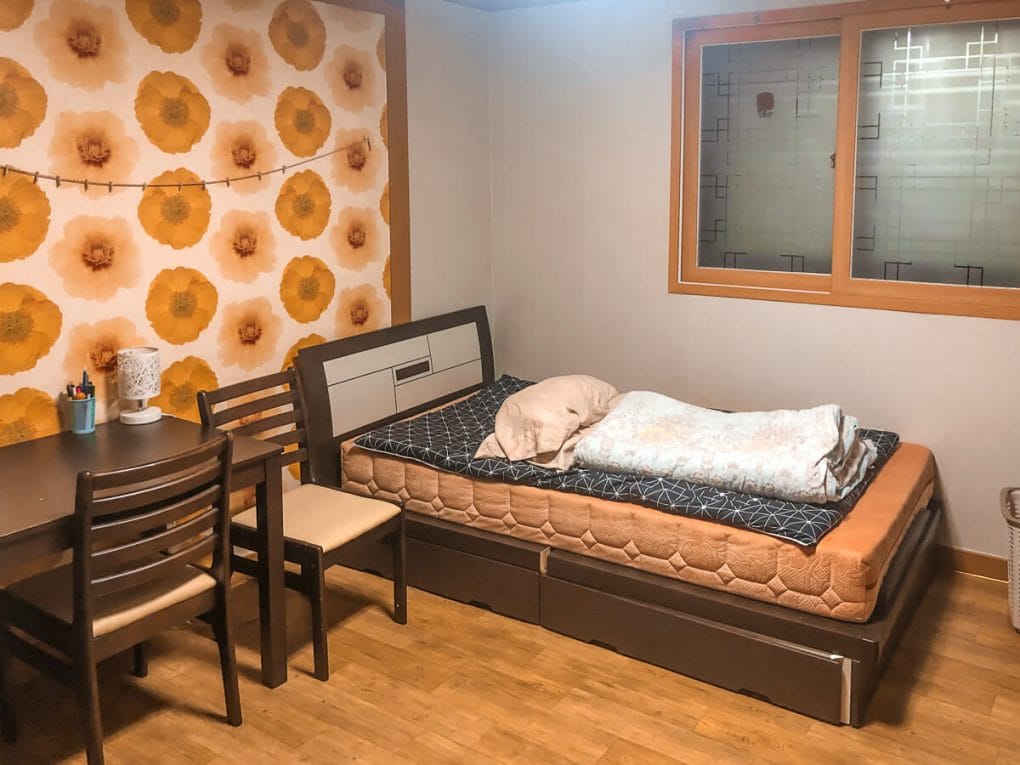If you’re thinking about teaching English in South Korea, you’ve no doubt heard about the EPIK program – a gig that places native English speakers in Korean public schools. Here’s all you need to know about the EPIK application.
The EPIK program is by far one of the best ways to teach English in South Korea – IMHO. While I can’t deny the process can be long, tedious, and requires a bit of work, the pros of teaching with EPIK outweigh the cons, and I highly recommend it.
As a former English teacher in Korea, I greatly enjoyed the affordable cost of living in Korea, the friendships I made, and the amazing job benefits with the EPIK program. I loved it so much I stayed for two years!
While everything you need to apply can be found directly on EPIK’s website, I’m here to outline the application process in greater detail to help you on your journey!
Here’s a step by step guide for how to apply to EPIK.
↠ Read More: A Former ESL Teacher Dishes: Is Teaching English Abroad Worth It?
This post may contain affiliate links, meaning at no additional cost to you, if you click my links and make a purchase, I may earn a small commission. Learn more on my disclosure page. Thank you for your support!

STEP 1: The EPIK Requirements
While the EPIK application requires a lot from prospective teachers, the main job requirements to teach in Korea can be boiled down to these three key things. You must:
- Be a native English speaker from the US, Canada, Australia, Ireland, New Zealand, or South Africa
- Have a Bachelor’s degree
- Have a TEFL certification or teacher’s license
- Proof of a clean background
After these key things, you’ll also need to provide a clean background check, a high-quality demo lesson, amongst other things. You can read more about the others on EPIK’s website EPIK’s website.
↠ Read More: What to Pack for South Korea – An EPIK Packing List

STEP 2: Choose When to Apply to EPIK
There are two different application or intake periods for EPIK that open up 6 months before the term you’re applying for starts.
You can apply for the spring intake which starts in March (application opens in August) or fall intake which starts around August (application in February).
In Korea, the school year actually starts in August, so the spring intake will have you starting at the beginning of the year vs the fall will see you starting in the middle
As far as open positions, the spring intake generally has more openings as it’s the beginning of the year.

STEP 3: Get TEFL Certified For EPIK
Right when you decide to apply – if you haven’t already – I recommend beginning your TEFL course. It can take months to take the classes, finish your in-class component (if you choose to do it), and have the TEFL certificate issued.
EPIK is understanding and allows you to apply before you’ve completed your course, but timing is everything. You must have your certificate in hand by the time you arrive in Korea for orientation so be sure to plan accordingly!
EPIK requires a TEFL certificate of at least 120+ hours of instruction. In-class hours are not required but they may give you an advantage on your application.
With that being said, if you’re interested in applying to teach in Busan, you actually do need to have at least 50 in-class hours!
On EPIK’s website, they state that they don’t give preference to any particular TEFL companies so choosing a TEFL course for EPIK can be tough! Here are two of my top recommendations for your consideration.
STEP 4: Apply with an EPIK Recruiter or Alone
After you’ve chosen your intake period and begun your TEFL course, you need to weigh your options and decide whether you’ll be applying through a recruiter or on your own. I personally applied with a recruiter, but there are pros and cons to both options!
I chose to apply to EPIK through CIEE’s Teach Abroad program. And while CIEE’s South Korea program is pricey, there were a few key reasons I decided to pony up the cash, primarily being the insane convenience of having another set of eyes and an expert helping me with my application and documents, plus the fact that the TEFL certification was included. But it’s more than possible to apply alone if you need to save the money.
Another reputable recruiter is Korvia – however they do not provide TEFL certification. They are a free recruiter many people use to apply to EPIK.
↠ Read More: A CIEE Teach Abroad in Korea Review + How to Save $200
Pros of Applying to EPIK with a Recruiter
- A recruiter handles the application process for you. The instructions provided by EPIK can be cryptic and confusing, so a recruiter who has years of experience with this specific application gave me peace of mind. They know exactly what you need and when you need it.
- A recruiter is another set of eyes on your application for anything you may have missed (like when I forgot to write my middle name on the very first page).
- Some recruiters also over TEFL certifications as part of their services. I recommend iTTT for TEFL certifications
- Recruiters also offer great resources, tips and things to know when moving to Korea. They let me know I could apply for a US Residency Tax Certificate to be exempt from Korean income taxes (Form 8802 application and Form 6166 letter). I wouldn’t have known it was an option without CIEE! They also sent helpful information for the best way to get my FBI background check, apostille, visa application and more.
- Many recruiters offer additional job search assistance if EPIK doesn’t work out!
Cons of Applying to EPIK with a Recruiter
- Applying through CIEE or a recruiter who requires you to pay, is more expensive than applying on your own. Overall, I don’t recommend paying for a recruiter as that’s money you can keep in your pocket when you apply by yourself.
- Applying through a recruiter delays communication from EPIK. EPIK treats the recruiter as the applicant, so everything goes to your recruiter before being passed on to you – even your final placement and contract. In an application process that already involves a lot of waiting, this proved to be unbearable
↠ Read More: Leaving Korea Checklist: What To Do When Moving Home

STEP 5: The EPIK Application
Now that you have the preliminary decisions out of the way, you’re ready to start the lengthy application process! There are many different documents you need to produce yourself as well as documents you need to request and have authenticated. There is a lot of coordination to be done!
I’ve put together the cost of applying to EPIK in another cost because it can add up quickly with all of the documents and certifications needed. It’s a factor to consider in your application. While this is from when I applied in 2017, much of the same documents are required.
EPIK Required Documents
The list of required documents for EPIK varies depending on your situation as well as your citizenship. But to give you a rough idea of what you need, here is the list of required documents for EPIK.
- EPIK Application Form
- A Professional Photo
- Two Letters of Recommendation with Ink Signatures – No Copies
- Apostilled FBI (federal) Background Check
- Apostilled/Notarized Copy of Bachelor’s Degree
- Apostilled birth certificate (UK/AU citizens)
- Official/Unopened College Transcripts
- Proof of teaching qualification or TEFL certificate or letter certifying completion prior to the contract start date
- Photos of tattoos (if applicable)
- Sample lesson plan (plus two optional* handouts)
- Resume
- Passport information page
- Passport photos (I recommend 6)
- Seoul Attachment Letter – Optional (If applying to Seoul)
- Final Declaration Forms – For the Final Application
- Information/Image Use Consent Declaration
Once you’ve gathered all of the above docs, you’ll need to submit everything electronically for preliminary review. Make sure you hold on to everything in a safe place, you’ll need to mail the hard copies to Korea at the final stage of this entire process – the original documents, and a second copy of everything.
EPIK Placement Preference: Where to Teach in Korea
On the EPIK application form, they’ll ask you for personal information, your previous work experience, and also – your living preference in Korea!
One major con of EPIK is that they only allow you to choose one placement preference! Here you’ll need to name the city that you would like to live and teach in Korea.
Placements tend to be first come first serve so the sooner you send off your application the better chance you’ll have of getting your number one choice.
For those interested in Seoul, a word of caution – Seoul is extremely competitive as far as public school placement. Nearly everyone with dreams to teach English in South Korea imagines themselves in Seoul and I was no exception. Sadly receiving a job in Seoul is like winning the lottery.
I recommend instead going for a less popular, but large city in Korea for the best experience like Daegu, Busan, Daejeon, and Incheon.
If there aren’t any job openings for the city you chose on your application, you’re at the mercy of the EPIK board. And you don’t want to end up in a rural place!

STEP 6: The EPIK Interview + Final Application
The next step in this process is a Skype interview with an EPIK coordinator to go over your application and ask more in-depth questions about your interest and experience teaching.
EPIK schedules the Skype interview during Korean work hours. Depending on your time zone, your appointment may be late at night or very early in the morning!
Be sure to dress in business clothes, seat yourself in a quiet and neat room, and come prepared with headphones to minimize noise distractions.
Interviews can last anywhere from 15 minutes to 45 minutes or more. Mine was only about 25. It just depends on who your interviewer is and the content of your application.
After your interview, EPIK sends out rejections or acceptances via email.
EPIK Interview Questions
If I’m honest, I have no idea what questions you’ll be asked during your interview. EPIK doesn’t disclose anything related to the interview process to help teachers prepare.
However, I do know what I was asked in my interview 😉 Here are some of the things I was asked during my EPIK interview:
- Questions to confirm my identity and personal details: name, birthday, where I was born, where did I go to school, etc.
- Why do you want to live in [city preference] / teach in Korea?
- How does your previous education / work experience relate to teaching?
- How do you manage a classroom?
- What are three words to describe yourself?
- Can you elaborate more on your teaching philosophy?
- How will you adjust to Korean culture?
- What do you think will be your greatest challenge to overcome after moving to Korea?
- Questions specific to my personal essay
My interviewer also really focused on “warning” me about using drugs in Korea, lying on my application, asking me about mental health (Unfortunately Korea discriminates against those who have a history of depression or mental health issues so be warned), and what I can expect in terms of moving to Korea and when I would hear back.
I received news about passing the EPIK interview about 2-3 days after.
EPIK Acceptance
If you’re accepted, you’ll need to submit your application for the final review. It should be all the same documents you’ve already submitted online unless your interviewer recommended any changes.
Once finalized, you’ll mail all of your official documentation and application paperwork as hard copies directly to EPIK – don’t forget to send the originals and a copy!
Now it’s time to wait for the final word! At this point though, you’re basically an English teacher in Korea!

STEP 7: Apply for Your E-2 Teacher’s Visa
When you finally receive your final acceptance and placement, it’s time to apply for your Korean E2 visa! EPIK will send your acceptance via email.
A week later you’ll receive your contract, placement, and acceptance letter in the mail.
Here’s how to get an E2 visa before leaving for Korea:
Required Documents for Korea’s E2 Visa Application:
- A Completed Visa Application Form (Found on the Korean embassy’s website)
- A Passport Photo
- A $45 Money Order (The Processing Fee for Americans)
- Passport + 1 Copy of the Data Page
- EPIK Contract
- Notice of Appointment Letter
- A Pre-Paid, Self-Addressed Envelope (for Return)
Please be sure to confirm everything you need with your local Korean embassy/consulate as it may vary on your specific application and residence. All important information is online and if you have any questions, you can call your nearest embassy/consulate directly. If you’re from the Midwest like me, the Chicago visa issuance information webpage can be accessed here.
The specific process for EPIK applicants is (fairly) clearly listed. The standard processing time for visa issuance is about 5 days + mail time, and I found this to be very accurate with my own visa application.
E2 visa tip: The documents for your visa aren’t returned, other than your passport of course! The Notice of Appointment Letter is a cool official certificate that shows your accomplishment of being accepted into the EPIK program. You may want to take a quick snapshot of it before never seeing it again! Just if you’re into that sort of thing!

STEP 8: Buy Your Plane Ticket to Korea!
Voila! Time to buy your one-way ticket to South Korea! Depending on your placement, your orientation will be in Seoul or Busan. Time to start preparing your packing-lists, planning your going away party, and maybe learning a few survival Korean phrases!
The EPIK Application Timeline.
EPIK states on their website that the sooner you submit your application, the better your chances of being placed in your preferred city. I recommend preparing the documents and TEFL certification a few months before the application cycle opens to avoid any stress or last-minute submissions. You won’t regret it!
To give you an idea of the EPIK application timing, here’s what my EPIK process looked like as a reference:
April – I made the final decision to apply to EPIK for the spring intake (August application cycle). I researched my options and requested my letters of recommendation.
Mid August – I applied and was accepted to CIEE’s Teach Abroad program.
Beginning of September – I gathered and completed all required documents and submitted my preliminary application electronically to EPIK.
Mid October/4 weeks later – I received an email stating that my preliminary application was accepted and that EPIK wanted to interview me.
End of October/1 week later – I had my Skype interview.
End of October/1 week later – I received the news that I’d passed the interview.
Beginning of November/1 week later – Hard copies of my final application and paperwork were mailed to Korea.
Beginning of January/2 months later – I finally received my final placement and contract! The waiting at this point was unbearable!
Mid January/2 weeks later – I received my contract in the mail and applied for my visa.
End of January/1.5 weeks later – I received my visa and booked my flight!
Phew! You’ve made it through the epic process on how to apply to EPIK! Good luck on your new journey abroad. Living and teaching in Korea is an incredible opportunity and I’m sure you’re going to love it!
Do you have any questions or suggestions for how to apply to EPIK? Comment below – I’m happy to help! If you’re curious about the cost of living in Korea, I’ve got that covered too.





How long is a vocation after the two year contract and after the two years are up. Can I resign….
Hi Robert! There is actually no limit to how many years you can work as an EPIK teacher in Korea to the best of my knowledge! The two year limit is the max amount of time you can teach in Korea without paying Korean income tax. After two years, you must begin to pay the national income tax per the treaty set between America and Korea. As an EPIK teacher however, your position is reevaluated on a yearly basis depending on your time there, the school’s budget and even the need. So of course while there is no set limit, your position is ultimately at the mercy of the Department of Education in Korea.
Hi Brit!
Thank you for the informative blog. Something I am still a bit confused about is the order of document submission. From my understanding, I should email the application form and letters of recommendation to [email protected] and then wait to be scheduled for an interview and then a confirmation of acceptance. Afterwards, I should submit my CRC, TEFL certification, and diploma). Is that true that the initial application is just the application form and recommendations?
Also, were you able to do community projects and such in your spare time as an EPIK teacher?
Thank you!,
Mary
Hi Mary! Thanks so much for your interest in my blog!! I’m glad it’s been helpful!
Yes, you are correct. I confirmed with the current website requirements (it’s been a while so I wanted to make sure haha) and it states you should also send a scanned photo!
If they select you for an interview and you pass, they’ll ask you to mail all the final and verified documents!
I have plenty of free time to enjoy my hobbies and travel around Korea. There are many different organizations here that people volunteer for such causes like North Korean refugees, single mothers etc. It’s a very nice life here as an English teacher!!
Any other questions you have for me, please feel free to reach out!
Kind regards,
Brit
Thank you for the reply! I am really interested in working with North Korean refugees actually! Do you think I would have free time to work with them as an EPIK teacher?
Also, do you have any tips for lesson planning?
Thanks again!,
Mary
You should definitely have the time! But of course it depends on your specific school situation, location, and the organization you choose to volunteer for. I’m not sure of many organizations where you work one on one with North Korean refugees in any place other than Seoul. I don’t do it personally so sadly I don’t have much information for you!
Lesson planning is very scary at first but is actually very easy once you get the hang of it! We all use a website called waygook.org to get our materials. It’s where other English teachers have shared their own activities and lessons. There are many helpful blogs online though that explain how to create a good lesson plan for the EPIK lesson plan! I’d just google around to find the best one that explains it well 🙂
Hey Brit! I am an official subscriber. You’re very thorough and helpful, so thanks again! I was wondering, how long did your visa process take? Also, I have studied abroad in Korea before. Do you think this will put me at a disadvantage?
Thanks!,
Mary
Hi Mary, I’m so happy to hear you’re a subscriber! I really appreciate the support ☺️ As for the visa, as soon as I get my application approved/certificate that said I’m employed, it took seven days for me to mail in my passport to the nearest embassy/consulate and for me to get it back! I believe their standard processing time is seven days not including mail time so it can vary on how busy they are when you send in your application.
I don’t think that will be a disadvantage for you – I think it would actually help your application! I have a few friends here who previously taught or studied abroad in Korea who went home and then applied to EPIK! It seemed to not be a problem for them 🙂
Hi Brit!
Thank you again for all your help. As the Spring 2019 EPIK deadline approaches, I had a question about location preference. Were you able to select the province you were placed in? What factors affected your placement (if you are aware) and when did you find out your placement?
If you prefer to email instead, please feel free to reply privately!
Thank you again,
Mary
Hi Mary! Sadly I had zero control over my placement and as far as I know that’s still the case. The only thing I could do was give one city placement and I was told Seoul was competitive so choose a place that I could more feasibly get! I put Daegu and I got Daegu!
I’m sorry, I know that’s not helpful, but the inner workings and decisions of EPIK placements is very unknown to me and I think the public!
Thank you Brit for your help. As I submit my preliminary application, I was wondering about the hard copies of all the additional documents they need afterwards (diploma, transcripts, passport photos, etc.). Do you send these documents all at once in the same envelope?
Thanks again!
Yes! You will send all hardcopies together once you have the approval of the first round of electronic applications
Hello there,
My name is kripaj and i am from India, well i am very helped by your post and became clear of many questions, but you’ve mentioned that people from native english speaking countries can apply, so does that mean its not possible for me to apply.
Or has there been any change in the government lately?
Hi Kripaj! Sadly I believe the EPIK program gives preference to those from native English speaking countries. However, other people can apply but I believe they must have taken an English aptitude test and have high scores! You can actually email them directly and ask 🙂 Sorry I don’t have more answers for you! I hope this helps.
Hi Brit!
Thank you for all the helpful information! I am currently going through CIEE and utilizing the TEFL Course. I do have a Teaching Degree; would I still need the TEFL for Korea? Also, do I still have to go through EPIK after submitting my application to CIEE? It was my understanding that CIEE works with EPIK and that his how I would submit all my documents and otherwise be informed of further processes. I know it has been awhile for you but, I do hope you can help me with this.
Thank you for your time.
Sincerely,
Symone P.
Hi Symone! So I believe technically you don’t need a TEFL if you already have a teaching degree but if CIEE is giving you access included with their fee, I recommend taking it anyways to help with your application and just to have as a professional certificate!! When you apply with CIEE, they take care of the entire application on your behalf so you don’t need to submit anything additional to EPIK on your own. You can see exactly what EPIK requires on their official website EPIK.go.kr but CIEE was great at handling everything for me when I applied and they’ll tell you the exact step by step process needed!! I hope this helps! If you have any other questions feel free to email be directly 😀 good luck!!
Hi Brit!
Your blog is super informative and thorough. I appreciate all the hard work you’ve put into creating these posts! When it comes time to mail your final documents, do you know if you have to send all of the paperwork together? I’m worried because my in-class TEFL hours won’t be done until December, but I know the sooner you submit your documents the better chance you have of getting placed. Am I able to send the TEFL certificate separately after I submit all the other paperwork?
Thank you so much again!
Hi Meg!! Thank you for your kind words!! As for the TEFL, when I applied I hadn’t officially completed my certificate yet at time of application, so I sent instead an official letter from the TEFL provider saying expected date of completion and it was fine. As long as you have the certificate in hand when you arrive, you’re all good! But you might want to email EPIK and ask them directly just to confirm exactly what they want to see and when the absolute latest date is that they need to see a copy of the final certificate! I hope this helps!!
Hello, I’m thinking of getting tefl certified and was wondering where you got your TEFL ?
Hi there – thank you for your comment 🙂 I got my TEFL from CIEE! But for someone on a budget or only planning on teaching for a year or two in certain programs, a more affordable online course should be just fine! PremierTEFL and iTTT are good budget friendly options. But for the best I do recommend CIEE or International TEFL Academy (or even CELTA for those interested in teaching English as a lifelong career)
Hello, I’ve tried researching this question on my own, but there doesn’t seem to be an exact yes or no answer. Do I need to get my official transcripts notarized? If so, do they need to be apostilled too? How about my Tefl certification? Notarized and then apostilled? Or is a letter from my Tefl provider enough proof?
Hi Cheryl! You do not need to get your official transcripts notarized or Apostilled. They should come in a sealed and officially stamped envelope from your school, and you should send it to EPIK unopened. If it’s opened, it’s no longer official. For my final EPIK application, I sent in a notarized copy (not Apostilled) of my TEFL to be safe, and brought the original with them in case anyone checked – which no one did. I hope this helps 🙂 You can see the list of required docs on EPIKs website and they should say “Apostilled” if needed!
Hi Brit,
I am a grad student who is interested in teaching English in Korea but I am going to wait until I graduate since my degree comes with a TESOL cert.
I have a few questions. I am currently planning to stay in Korea(soon) for an extended period of time(months) in order to study(not at Korean school) and I was wondering if you might know of good schools in Korea that do part-time positions? Or maybe cafes? I have done research on hagwons and cafes but I keep finding bad reviews.
Your help is appreciated.
Thanks,
Amber
Hi Amber! Unfortunately because I was an EPIK teacher, I don’t know of any specific Hagwons I can recommend :/ but some of my top tips are to reach out to recruiters, check the Korean backlist, and join Facebook groups. Hagwons get a bad rep because in all honesty, they’re generally not nice places to work all around (notorious for giving teachers a heavy workload with little pay). But people take the job to have the opportunity to live and travel in Korea while earning an income. And sometimes Hagwons get bad reviews for reasons that may not mean they’re fully a bad place to work, so it’s good to take reviews with a grain of salt, and focus on the most vital aspects: were teachers paid? Were employers respectful? Reddit can also be a great resource, I especially recommend r/TEFL and the thread “good Hagwons in Korea?”. Your other option is to visit schools and apply in person on your visit to better gauge what would be a good work environment for you. I hope this helps!
Hi Brit~ thanks for responding! I will definitely check out the reddit thread. I am hoping to apply to EPIK once I graduate but it would be nice to get some experience(like at a hagwon) that way I can feel it out and see if I like it. I appreciate your help~ thanks again!